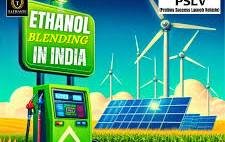NEW DELHI: Ethanol blending in petrol has resulted in foreign exchange savings of over Rs 28,400 crore during the Ethanol Supply Year 2023-24, according to data presented by the Ministry of Petroleum and Natural Gas in the Rajya Sabha. However, the government has not yet launched a programme for blending ethanol with diesel, a measure that could further reduce dependence on imported petroleum products.
Ethanol blending with petrol is part of a broader strategy to promote biofuels and reduce India’s reliance on fossil fuel imports. Currently, there is no target set for ethanol blending in diesel by 2035. However, research and development activities in this area are underway. In 2022-23, Indian Oil Corporation Limited conducted a pilot study to assess the performance and emissions of a 5 per cent ethanol blend in diesel.
The government’s ethanol blending initiative has gained significant momentum in recent years. The programme not only reduces greenhouse gas emissions but also supports the domestic agriculture sector by utilising surplus sugarcane and grains for ethanol production. The focus on such alternative fuels aligns with India’s long-term goals of energy security and environmental sustainability.
While ethanol blending in diesel remains in the exploratory phase, experts believe that advancing this initiative could provide additional savings in foreign exchange and further bolster India’s efforts to reduce its energy import bill. The government continues to push for innovation in biofuel technologies to enhance its energy mix and lower its carbon footprint.
India’s reliance on imported crude oil has steadily increased over the last five years, with the import dependency reaching 87.7 per cent in the financial year 2023-24, according to data provided by the Ministry of Petroleum and Natural Gas in the Rajya Sabha. This marks a significant rise from 85.0 per cent in 2019-20, reflecting the challenges posed by growing energy demand amid stagnant domestic oil production.
The government has attributed the rise in oil imports to India’s sustained economic growth, leading to greater industrialisation, urbanisation, and rising energy consumption. Despite various measures to boost domestic production, the country’s oil output has declined due to natural depletion and increasing water cut in mature wells.
Efforts to diversify the energy mix have included a push towards natural gas, renewable energy, biofuels, and electric mobility. Under the Ethanol Blended Petrol Programme, forex savings of Rs 1.09 lakh crore have been achieved from 2013-14 to 2023-24. Additionally, the SATAT initiative promotes compressed biogas, while over 18,000 electric vehicle charging stations have been set up by Oil Marketing Companies.
To reduce import dependency, the government has implemented numerous policies, including the Hydrocarbon Exploration and Licensing Policy, measures to incentivise enhanced recovery methods, and the launch of the National Data Repository. Steps have also been taken to monetise hydrocarbon discoveries and open new basins for exploration.
However, the growing reliance on imports underscores the challenges of meeting energy demands in an expanding economy. While alternative energy measures are yielding results, experts note that significant strides in domestic production are critical to achieving long-term energy security. India’s reliance on imported crude oil has increased over the past five years, with import dependency rising from 85.0% in 2019-20 to a provisional 87.7% in 2023-24. This trend is attributed to sustained economic growth, leading to higher energy consumption and increased imports.
The government’s initiatives to promote electric mobility, biofuels, and alternative energy sources have resulted in foreign exchange savings of approximately ₹1.09 lakh crore from Ethanol Supply Year (ESY) 2013-14 to ESY 2023-24. However, these measures have not significantly reduced overall crude oil imports due to the country’s growing energy demands.
Domestic crude oil production has declined in recent years, primarily due to natural declines and increased water cuts in mature fields. In response, the government has implemented policies such as the Hydrocarbon Exploration and Licensing Policy (HELP) and the Discovered Small Field Policy to boost domestic production.
To reduce the import burden, the government is promoting the use of natural gas, renewable energy, and alternative fuels like ethanol, compressed biogas, and biodiesel. The Sustainable Alternative Towards Affordable Transportation (SATAT) initiative and the commissioning of over 18,000 electric vehicle charging stations by Oil Marketing Companies are part of these efforts.
Despite these initiatives, India’s energy consumption continues to rise due to factors like industrialization, urbanization, and improved living standards, leading to increased crude oil imports.





